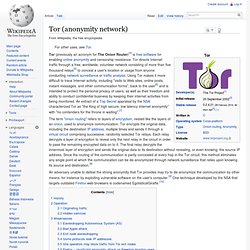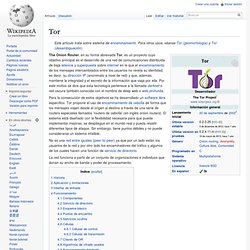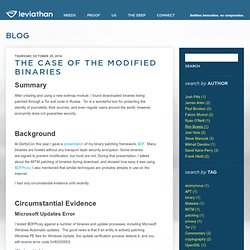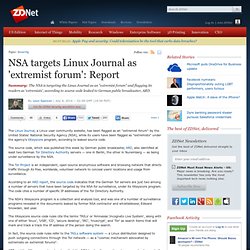

Tor Project: Anonymity Online. Who uses Tor ? Tor (anonymity network) Tor (previously an acronym for The Onion Router)[4] is free software for enabling online anonymity and censorship resistance.

Tor directs Internet traffic through a free, worldwide, volunteer network consisting of more than five thousand relays[5] to conceal a user's location or usage from anyone conducting network surveillance or traffic analysis. Using Tor makes it more difficult to trace Internet activity, including "visits to Web sites, online posts, instant messages, and other communication forms", back to the user[6] and is intended to protect the personal privacy of users, as well as their freedom and ability to conduct confidential business by keeping their internet activities from being monitored.
An extract of a Top Secret appraisal by the NSA characterized Tor as "the King of high secure, low latency Internet anonymity" with "no contenders for the throne in waiting".[7] Alice's Tor client picks a random path to destination server Steven J. Tor. The Onion Router, en su forma abreviada Tor, es un proyecto cuyo objetivo principal es el desarrollo de una red de comunicaciones distribuida de baja latencia y superpuesta sobre internet en la que el encaminamiento de los mensajes intercambiados entre los usuarios no revela su identidad, es decir, su dirección IP (anonimato a nivel de red) y que, además, mantiene la integridad y el secreto de la información que viaja por ella.

Por este motivo se dice que esta tecnología pertenece a la llamada darknet o red oscura también conocida con el nombre de deep web o web profunda. Para la consecución de estos objetivos se ha desarrollado un software libre específico. Red Tor: anonimato y vulnerabilidades. Cancelan una charla de Black Hat sobre cómo identificar usuarios en Tor. ¿Cómo se puede romper el anonimato en TOR? The Case of the Modified Binaries. After creating and using a new exitmap module, I found downloaded binaries being patched through a Tor exit node in Russia.

Tor is a wonderful tool for protecting the identity of journalists, their sources, and even regular users around the world; however, anonymity does not guarantee security. At DerbyCon this year I gave a presentation of my binary patching framework, BDF. Many binaries are hosted without any transport layer security encryption. Some binaries are signed to prevent modification, but most are not. During that presentation, I talked about the MITM patching of binaries during download, and showed how easy it was using BDFProxy. I had only circumstantial evidence until recently.
Microsoft Updates Error I tested BDFProxy against a number of binaries and update processes, including Microsoft Windows Automatic updates. This error code indicates a failed signature verification for the downloaded binary. Russia Offers 4 Million Rubles to Crack the Tor Network. Tor logo used with permission.

Image remixed by Kevin Rothrock. The Russian government is offering almost 4 million rubles (about USD $100,000) to anyone who can devise a reliable way to decrypt data sent over the Tor anonymity network. A mounting campaign by the Kremlin against the open Internet, not to mention revelations in the United States about government spying, have made Tor increasingly attractive to Russian Internet users seeking to circumvent state censorship. Tor has encountered problems in Russia before. Indeed, the country’s principal security agency, the FSB, lobbied the Duma last year to ban Tor. Russian Pirate Party leader Stanislav Sharikov says the Russian government’s renewed interest in cracking Tor might have more to do with genuine police concerns than political repression. Of course, Tor is a “dual-use” technology. The U.S. government cites precisely these worrying uses of Tor when justifying its own efforts to decrypt users’ data.
NSA targets Linux Journal as 'extremist forum': Report. The Linux Journal, a Linux user community website, has been flagged as an "extremist forum" by the United States' National Security Agency (NSA), while its users have been flagged as "extremists" under the agency's XKeyscore program, according to leaked source code.

The source code, which was published this week by German public broadcaster, ARD, also identified at least two German Tor Directory Authority servers — one in Berlin, the other in Nuremberg — as being under surveillance by the NSA. The Tor Project is an independent, open-source anonymous software and browsing network that directs traffic through its free, worldwide, volunteer network to conceal users' locations and usage from surveillance. According to an ARD report, the source code indicates that the German Tor servers are just two among a number of servers that have been targeted by the NSA for surveillance, under its XKeyscore program. The code cites a number of specific IP addresses of the Tor Directory Authority.
Tor Gets Torched. What does I2P do for you ? The Freenet Project - /index. Autistici - Inventati. GNU's Framework for Secure Peer-to-Peer Networking. Syndie. Nightweb connects your Android device or PC. RetroShare. Avec ses ballons à l'hélium, Google veut offrir internet à toute la planète. Le Parisien | 11 Déc. 2014, 00h06 | MAJ : 11 Déc. 2014, 00h49 Toute la planète devrait bientôt bénéficier d'un accès à internet.

Oui, même les coins les plus reculés du monde et coupés de la technologie moderne. Du moins, c'est le but du projet «Loon» de Google. Grâce à des ballons stratosphériques gonflés à l'hélium, le géant de l'internet espère pouvoir apporter une connexion à la toile dans ces «zones blanches». Et d'après une information du journal «Le Figaro», le projet passe la vitesse supérieure ce jeudi avec la signature d'un partenariat entre Google et le Centre spatial français (Cnes).
Les ballons moins coûteux que les satellites «Plus de 5 milliards d'êtres humains ne sont pas connectés. Deep_Web. Lnternet_Securlty_Prlvacy.